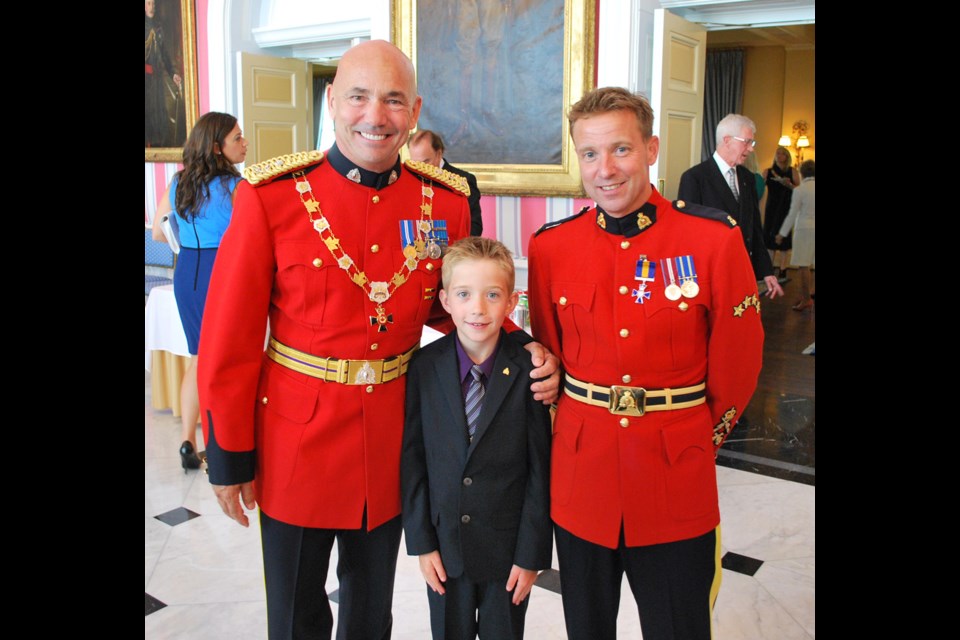It all started in February 1988.
Andy LeClair was visiting his brother in Burnaby for the very first time, and much to his surprise, he and his brother went for a run in 15-degree weather – he was in love.
LeClair, who was living in Quebec at the time (where it was a balmy -35 in February), thought it would be nice to one day live in the Lower Mainland. The opportunity to do so would come in the early '90s.
LeClair comes from a long line of police officers. His brother Steve is a staff sergeant in Whistler and both his grandfathers were police officers, so it’s no wonder he ended up a member of the Red Serge.
After graduating university with a bachelor of arts in psychology, LeClair, who is originally from Prince Edward Island, applied to both the RCMP and a local police department. The day before he was set to start training with the local police department, LeClair got a call from the Mounties – he'd been accepted into the fold.
Following his training in Regina, Sask., LeClair was hoping he would be posted in an urban location, but he never imagined he’d get sent to Burnaby, especially when his brother was already posted here.
But in the end that's exactly what happened.
LeClair packed his bags and headed West.
More than 23 years later, LeClair is an anomaly in the RCMP. While most officers in the national police force move from post to post, often staying less than 10 years in each town or city, LeClair has spent his entire career in Burnaby.
Looking back, the posting was one he is still thankful for because it allowed him, he told the NOW,to pursue a career in urban policing, which was his goal all along.
"I've always been geared to city policing. I like the tempo of it, I like the exposure to what you get here, so it's really suited my career path as far as what my real interests were," LeClair said.
The local staff sergeant has held nearly every role within the Burnaby RCMP. He's been a general duty constable, a school liaison officer, he's worked in the investigational operations unit and in the community operations unit, he’s worked in the criminal intelligence and gang units, he’s been a general duty corporal and he was part of Burnaby Strike Force when it first started. He was also a member of the emergency response team (that's Canadian for SWAT) back before it was an integrated unit, and stayed on for about one year and a half after it became an integrated unit.
"My career has been pretty varied because I started doing general patrol, then I went to school liaison in the mid '90s and that was a great, great job," he said. "To this day I go for a walk on Hastings (Street) and I bump into students with their kids now and they recognize me. So that really was a great job to get traction in the community."
In September, LeClair was honoured for his longterm dedication to the community, policing, crime reduction and voluteerism at a special ceremony in Ottawa, where he was presented with the Order of Merit of the Police Forces by Governor General David Johnston.
"It's an award that kind of speaks to the totality of your service and your commitment to the community,” LeClair said, “so it's a little bit tough to say why I should get it over other people because there's so many committed police officers that deserve an award like that, but I was supported by the officer in charge and I feel tremendously honoured that I received it.”
Any success he’s had within the RCMP is because of the collaborative nature of the Burnaby department and the emphasis it puts on teamwork, According to LeClair.
Today, LeClair is second-in-command of Burnaby RCMP's community operations section. Promoted to the rank of staff sergeant in 2012, he is responsible for advising the section's inspector on investigations and initiatives the officers are undertaking. He also oversees the prolific offenders suppression team.
“It’s a team that works identifying our most prolific criminals and those are usually property crime-type of criminals, the repeat offenders, the people that affect most people in the community," he said. "Then there's the community response team and there's a bit of overlap, obviously, because they'll target a bit of the same people.”
Both the prolific offenders suppression and community response teams target criminal activity that results in repeat calls for service. These are the repeat offenders or problem houses that require further investigation and concrete strategies for dealing with the problem, LeClair explained.
"Crime reduction is a little bit different than community policing,” he added. “(It’s about) targeting the individuals that are doing the crime, working collaboratively with other resources and stopping them from doing crime.”
Working out of the Hastings Street community police office, LeClair is happy with the success he’s had over the years and is pleased to still be a part of the community. When asked if he has any intention of leaving Burnaby, LeClair said he doesn’t, but added he isn’t one to dictate his career.
“It’s been a great career in Burnaby,” he said. “If I’ve got anything, I’ve got corporate knowledge of Burnaby. I know the people of Burnaby and I’m one of the residents of Burnaby.”



